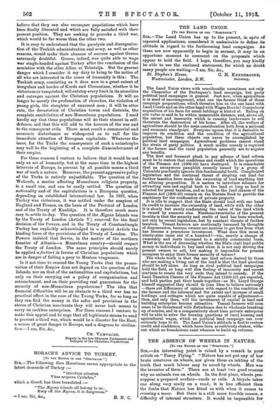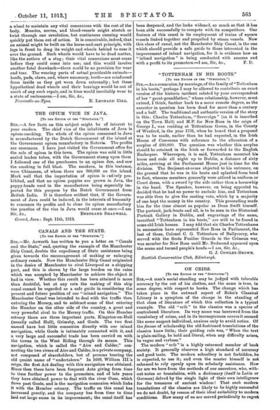THE ABSENCE OF WHEELS IN NATURE. [To THE EDITOR OF
THE " SPECTATOR."] Sin,ŌĆöAn interesting point is raised by a remark in your article on " Fancy Flying." "Nature has not put any of her brute creatures on wheels, nor given them an inkling of the truth that much labour may be saved by wheels. Man was the inventor of them." There are at least two good reasons why no animals run on wheels. In the first place, wheels pre- suppose a prepared surfaceŌĆöroads or rails. A bicycle takes one along very easily on a road; it is less efficient than the limbs that Nature has fitted us with when it comes to crossing a moor. But there is a still more forcible reason, a difficulty of internal structure. It would be impossible for-
a wheel to maintain any vital connexions with the rest of the body. Muscles, nerves, and blood-vessels might stretch or twist through one revolution, but continuous running would quickly put them out of action. It is conceivable, indeed, that an animal might he built on the horse-and-cart principle, with legs in front to drag its weight and wheels behind to ease it over the ground. Such wheels would have to be dead matter, like the antlers of a stag ; their vital connexions must cease before they could come into use; and this would involve another fatal drawbackŌĆöthere could be no provision for wear and tear. The wearing parts of actual practicable animalsŌĆö hoofs, pads, claws, and, where necessary, teethŌĆöare reinforced from inside as they get worn down externally ; but these hypothetical dead wheels and their bearings would be out of reach of any such repair, and in time would inevitably wear to a state of uselessness.ŌĆöI am, Sir, &c.,
.Newcastle-on-Tyne. E. LEONARD GILL.















































 Previous page
Previous page